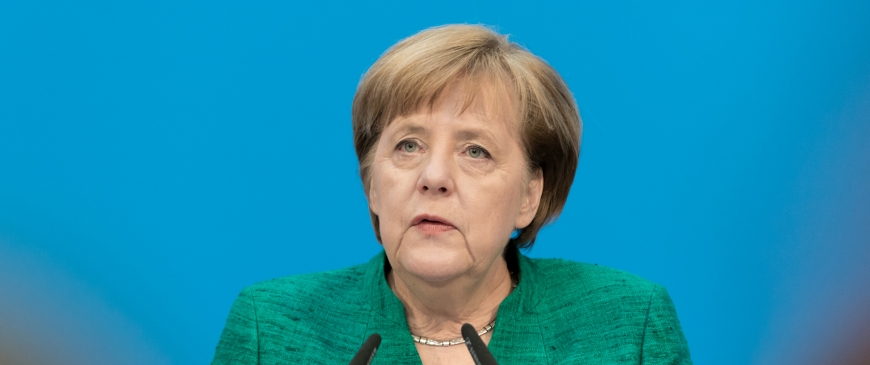
Merkel is going but Germany won’t shift its stance on Brexit
The departure of Angela Merkel from the leadership of her party will make little difference to the Brexit negotiations. One of the few things Germany’s mainstream parties – the three in government and the Free Democrats and Greens in opposition – agree on is giving firm support to Michel Barnier, the European commission’s chief negotiator. So even if the parties in the coalition change, the German line on Brexit – which to the British government seems hard – will not.
A few voices outside government, such as the chairman of the Bundestag foreign affairs committee, Norbert Röttgen, call for a softer approach. But when I was in Berlin last week I found nobody in the government who thought that Barnier should change his stance or become more flexible. The Germans are proud of the unity among the remaining 27 EU nations that they, the French and the commission have achieved. And they are quite annoyed by persistent requests from British ministers that they “rein in” the French and the European commission.
The British will hope that Merkel hangs on to the chancellorship: in a crisis she still has the potential to knock heads together and forge a deal in the European council. Her successor would probably lack that kind of authority, unless it is Wolfgang Schäuble, the veteran president of the Bundestag.
The Germans feel strategically beleaguered and this affects their view of Brexit. “We are a herbivore power, surrounded by carnivores,” I was told by a senior official. “In the years after 1989 we assumed that the world was converging towards the liberal, rules-based order that we espouse. But now we see reversal – in China, Russia, Turkey, central Europe and the US.”
German leaders find Donald Trump particularly hard to cope with: his hostility to multilateral institutions jars with their own worldview. They have always viewed the EU as a symbol of what they stand for, but the revival of power politics and strongman leaders – many of them hostile to the union – has made its survival and success an even bigger priority.
This colours the German line on Brexit, which some politicians regard as an existential threat to the EU. Many of them see the strength and cohesion of the EU as much more important than the risk of losing some trade with the UK.
German officials believe that the UK has to move in order to prevent no deal. They are aware that no deal would be bad for the EU, but do not appear to think that they have much responsibility to prevent it. Of course, that might change in a crisis.
Germans officials think – like the negotiators in Brussels and London – that a deal requires the UK to agree to an “interim” customs union with the EU; but that would have to last until the commission decided that other arrangements could supersede it. This would render the Irish backstop’s provision for customs checks across the Irish Sea unnecessary. But the part of the backstop that would put Northern Ireland in the EU’s single market for goods and agricultural products would still be needed to prevent regulatory checks on the border between the two parts of Ireland. And that would mean controls on goods, plants and animals crossing from Great Britain to Northern Ireland.
German officials reckon the UK could live with such controls, though some British ministers would surely disagree. The Germans expect Barnier to “de-dramatise” the impasse and minimise these single-market checks, so that many of them happen away from ports and airports.
The whole point of the Chequers plan for the UK to follow the EU’s rulebook was to preclude the need for checks on goods crossing the Irish Sea: Britain would de facto stay in the single market for goods and farm produce. But the Germans are adamantly opposed to removing all checks between the EU and the UK, through a common rulebook, for several reasons.
If the UK were allowed to divide the “four freedoms”, then Switzerland – currently in the single market for goods but not services, while accepting freedom of movement – would ask to curb flows of people. And, more importantly, countries within the EU, such as Italy, might ask for the same thing.
Officials do not trust the UK to commit to being a “rule-taker” in the single market for goods; they believe the British are too proud and sovereignty-conscious to put up with that status for very long.
Brexit must be seen to carry costs. If the EU offered the UK frictionless trade, it would not be evident that leaving the EU was worse than staying in. And then Eurosceptics across the EU would make the case for following Britain’s path.
Brexiteers have often claimed that German industrialists would intervene in favour of a deal that suited businesses in Germany and the UK. But that hasn’t happened. Although industrialists are fearful of no deal, they have put very little pressure on their government to seek a softer Brexit, for example by allowing the UK to stay in the single market for goods. Many of them echo the politicians, saying that if the British are allowed to pick holes in the single market, others will follow suit, weakening one of the EU’s greatest achievements as well as its institutions. Unwilling to rescue the Chequers plan, Germany – with or without Merkel – will push Britain towards the relatively hard Brexit of a Canada-style free trade agreement.
Charles Grant is director of the Centre for European Reform.
